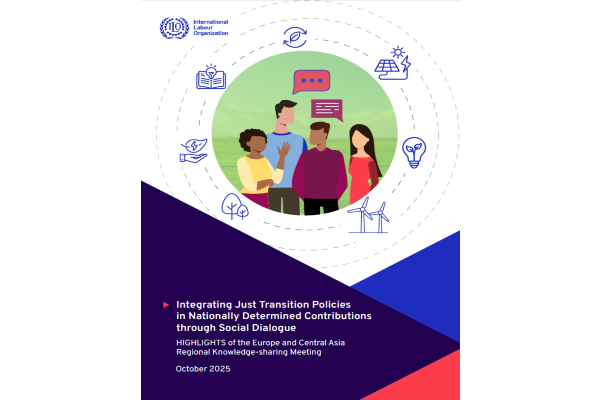
Governments, workers, and employers from over 15 countries across Europe and Central Asia have agreed that social dialogue is the decisive factor in delivering fair and effective climate action, as highlighted during the ILO Regional Knowledge-sharing Meeting on Integrating Just Transition Policies into Nationally Determined Contributions (NDCs) held from 1–3 October 2025 online.
Held under the ILO’s South-South and Triangular Cooperation (SSTC) initiative, the meeting served as a strategic bridge between COP29 in Baku and COP30 in Belém, providing practical guidance as countries finalize their NDCs 3.0 for submission to the UNFCCC in 2025.
Key Outcomes
• Social dialogue is non-negotiable.
Participants underscored that climate policies lacking worker and employer participation risk failing on equity, legitimacy, and implementation. ILO findings show that while 68% of global NDCs mention employment, only 18% reference social dialogue, exposing a critical gap.
• Just Transition must be gender-responsive and inclusive.
Women, youth, and vulnerable workers face disproportionate climate risks. The meeting echoed COP30’s call for climate policies that intentionally address gender inequalities and ensure equal access to green jobs and skills.
• Productivity and innovation are central to climate resilience.
Countries highlighted the need to build “productivity ecosystems” that support green technologies, skills development, and sustainable enterprises—echoing insights from the ILO brief Understanding Productivity and Productivity Growth.
• Evidence-based modelling strengthens NDCs.
Scenario planning and socio-economic modelling were recognized as key tools for anticipating sectoral impacts—reinforcing recommendations from the ILO brief Modelling Pathways Towards a Just Transition.
• Financing must reach workers and MSMEs.
Following the COP29 commitment of USD 300 billion per year by 2035 in climate finance, UN agencies stressed the importance of making funds accessible to those driving innovation on the ground. MSMEs, in particular, require targeted support.
South-South Cooperation Driving Momentum
Countries showcased progress made through SSTC, from green job centres in Uzbekistan to joint climate negotiation platforms in Kyrgyzstan and Amazon bioeconomy initiatives in Brazil. These exchanges demonstrate how peer learning accelerates the adoption of equitable, job-rich climate solutions.
Looking Ahead to COP30
Participants agreed that 2025 is the decade of delivery, with NDCs 3.0 expected to move beyond ambition and focus on implementation. National tripartite commissions were identified as essential in shaping and monitoring these commitments.
The outcomes of the meeting reinforce the vision set out in the COP30 Just Transition Brief: climate action must be low-carbon, high-inclusion, and high-opportunity, ensuring no worker, enterprise, or community is left behind.
For more information:
Email: martinezc@ilo.org | www.ilo.org

